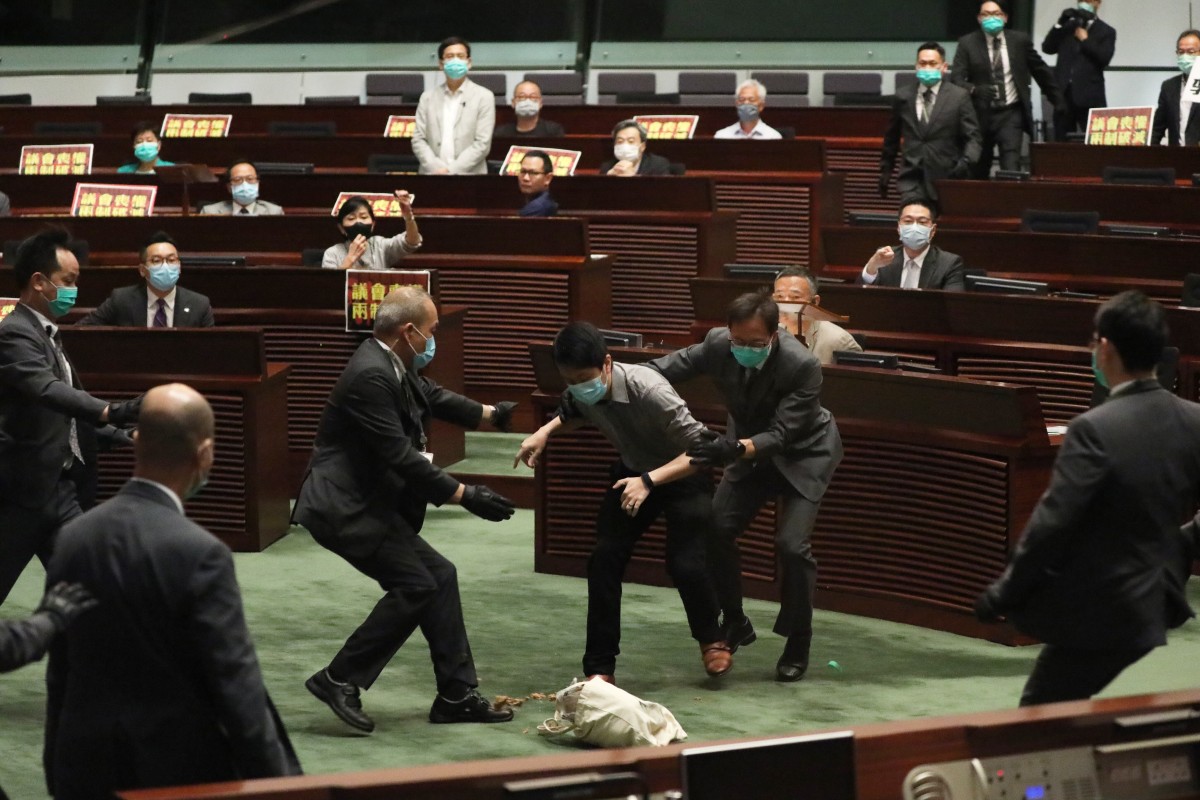 Democratic Party legislator Ted Hui Chi-fung throws what he says is a bottle of rotten plants during a debate in the Legislative Council on May 28.
Democratic Party legislator Ted Hui Chi-fung throws what he says is a bottle of rotten plants during a debate in the Legislative Council on May 28.
Hong Kong’s constitutional obligations to enact laws on our own to prohibit treason, secession, sedition, subversion and a whole slew of espionage activities had been simmering on the back burner since 2003, and it was only a matter of time before
In 2018, Tam Yiu Chung, Hong Kong’s sole delegate to the National People's Congress Standing Committee, the top echelon of the national legislature, came away from the Two Sessions gatherings with some thoughts.
He aired concerns that Hongkongers chanting slogans calling for an end to “one-party dictatorship” on the mainland could one day be disqualified from running in elections. He was giving Hongkongers a sense of what Beijing meant by implementing the “one country, two systems” policy “comprehensively and accurately”, and it foretold what transpired at the NPC last week.
Months of violence and social unrest, the binary politics of blue and yellow ribbons, social polarisation and the few who made spectacles of themselves by asking foreign governments to intervene: all these issues have become the central government’s justifications for its new-found assertiveness.
Months of violence and social unrest, the binary politics of blue and yellow ribbons, social polarisation and the few who made spectacles of themselves by asking foreign governments to intervene: all these issues have become the central government’s justifications for its new-found assertiveness.
They have made national security legislation for Hong Kong more than just a constitutional obligation. And once the necessity for the legislation has been established, anything goes, as has been the case in many countries.
Hong Kong was once a sophisticated international city on a par with London and New York, but it is now in a rotten state, with parliamentary politics degenerating into sophomoric stunts like the hurling of foul-smelling, decaying plant matter. But, of course, the flaws in our political system have been glaring for years.
Hongkongers with BN(O) passports could be eligible for UK citizenship if China imposes security law
Given the strong headwinds against electoral reform and the incompetence of those tasked to lead Hong Kong’s “executive-led” system, the anti-government camp had every excuse to act up, pull political stunts and get away with it.
But we must not forget the pro-establishment bloc’s role in this. In spite of all the efforts made and resources used to ensure their majority in the Legislative Council, pro-Beijing lawmakers quite simply failed to curb the obstructionist theatrics of the opposition.
And so that entire saga over the House Committee chairperson election and Beijing’s reaction foreshadowed the NPC’s decision to move forward with national security legislation last week. The opposition in Hong Kong – for having gone to great lengths to tread close to Beijing’s “red lines” – and the pro-Beijing camp – for having to be told not just what to do but also when to do it – had both been asking for it.
These pathetic excuses for lawmakers made a farce not only of Legco and our political process but also of “one country”. They played an instrumental role in placing Hong Kong in this predicament.
It was clear from the moment Beijing made it known it was drawing up a national security law for Hong Kong that it would become a reality for the city. So the rush by the government and the pro-establishment camp to come out in support of the new law was just a sad show of political desperation.
Reality is not a stance and does not need to be supported. What is essential is how to carve out whatever little space for political manoeuvre is afforded by the new law, and how to communicate Hongkongers’ concerns, including those over law enforcement bodies and
arrangements, to Beijing.
But when those privileged few who have Beijing’s ear are busy signing petitions, Hongkongers are at risk of being left out in the cold.
No comments:
Post a Comment